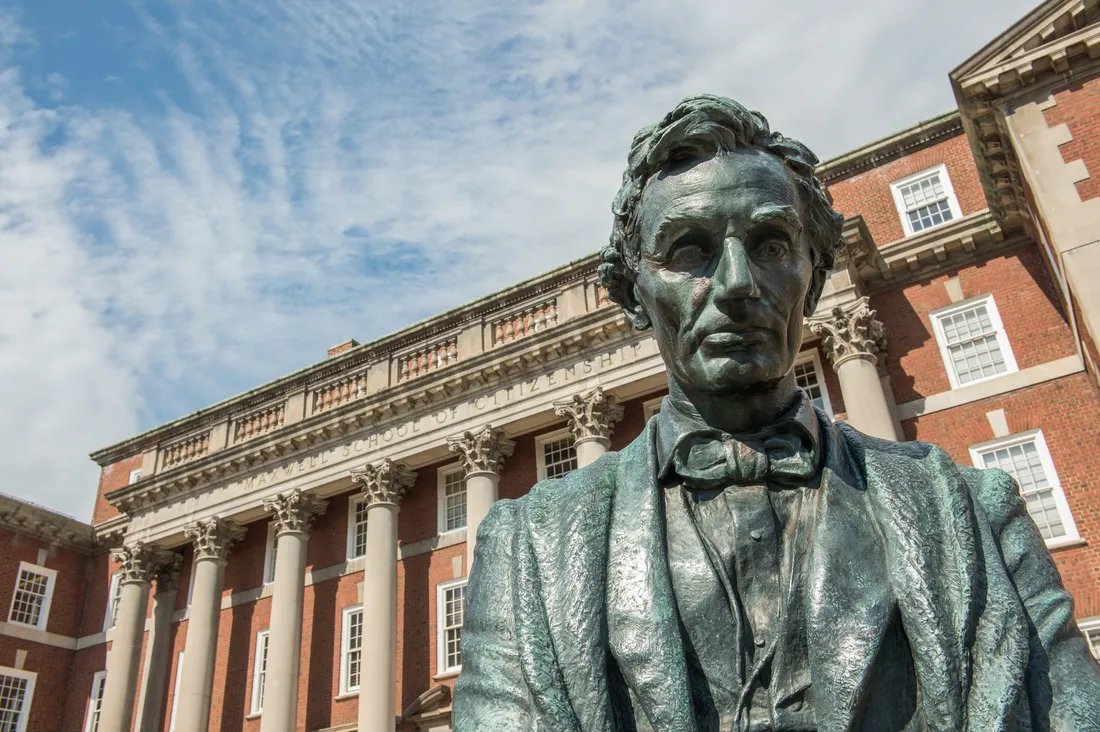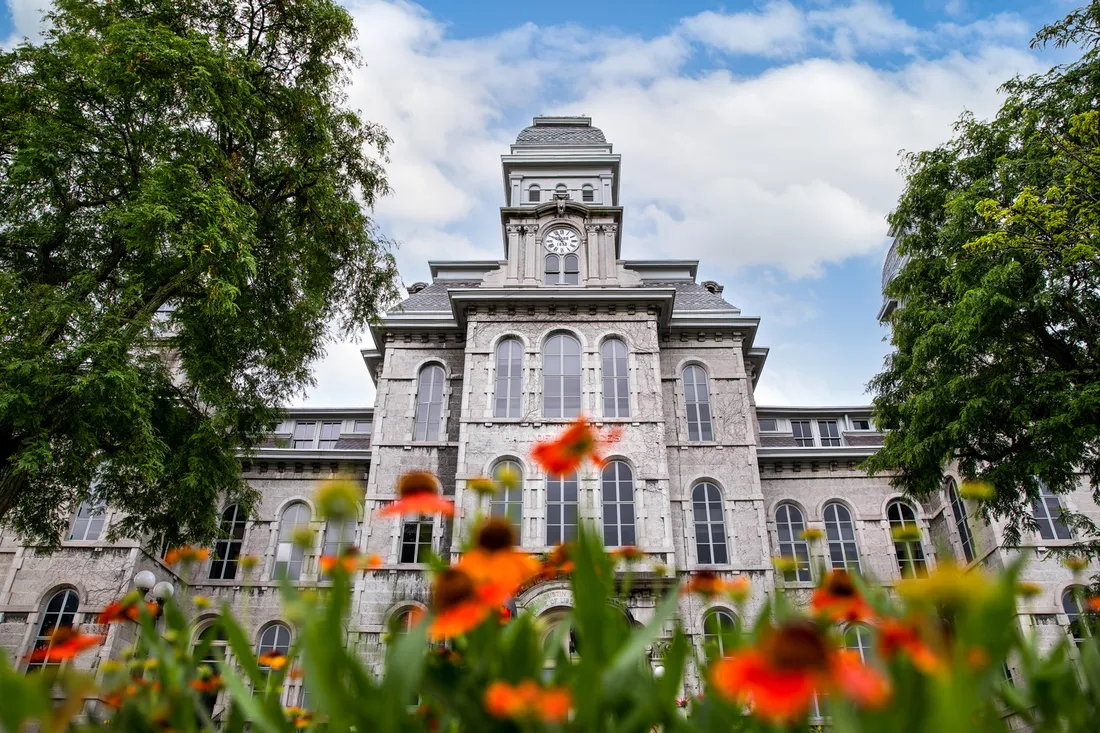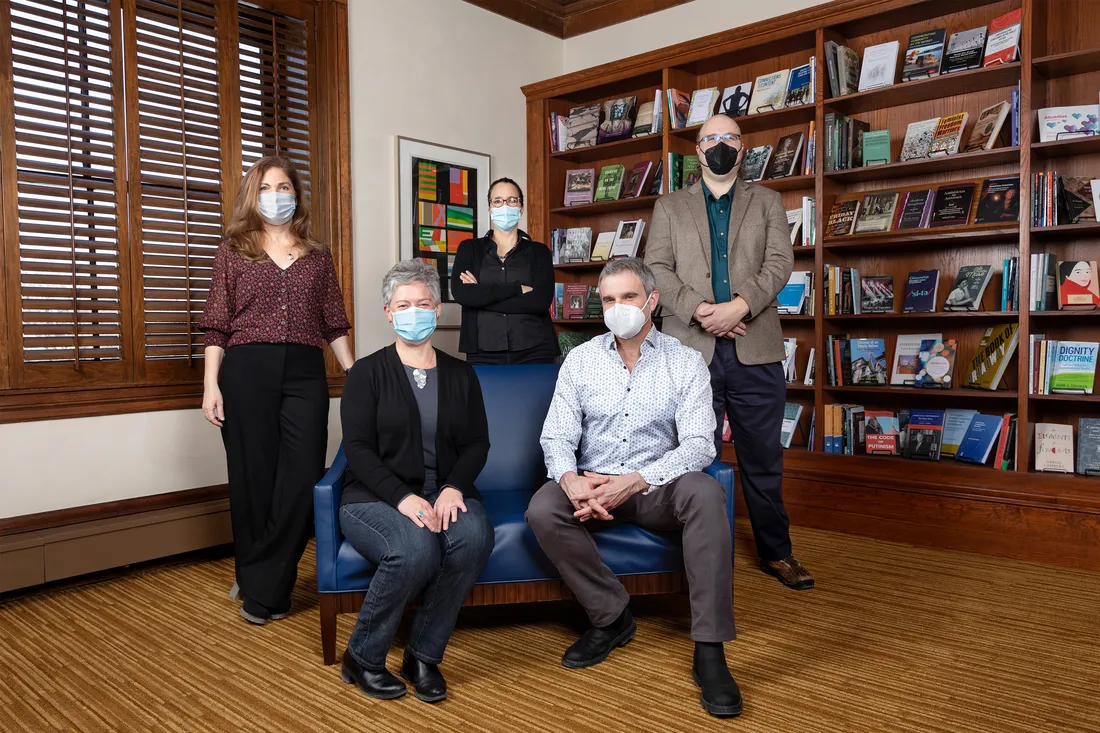
"Faculty fellows exemplify the innovation and distinction for which Syracuse is known," says Humanities Center Director Vivian May (seated, left), with this year's cohort.
What do environmental history, cultural anthropology and 19th-century American literature have in common? They’re fields at the nexus of the humanities and humanistic social sciences. They also inform the work of this year’s class of Humanities Center (HC) Faculty Fellows—researchers committed to understanding what it means to be human.
Dorri Beam, associate professor of English in the College of Arts of Sciences, is this year’s Syracuse Symposium Faculty Fellow. She is joined by three other HC fellows: Gareth Fisher and Jeanette Jouili, associate professors of religion in Arts and Sciences, and Robert Wilson, associate professor of geography and the environment in both Arts and Sciences and the Maxwell School of Citizenship and Public Affairs.
“Faculty fellows exemplify the innovation and distinction for which Syracuse is known,” says HC Director Vivian May, adding that the center, located in the historic Tolley Humanities Building and supported by Arts and Sciences, serves the University at large. “Their work is steeped in methodologies fundamental to addressing complex theoretical questions and public-facing study.”
Faculty fellows examine narratives, genres and communities that are frequently misunderstood, under-represented or, in some cases, wholly missing from existing bodies of research.
Vivian May, Humanities Center director
The fellowships are part of a rich array of HC programming that includes the annually themed Syracuse Symposium, the Central New York Humanities Corridor (a large-scale, regional research consortium), visiting professorships and other forms of research support.
Humanistic inquiry has taken on a renewed sense of urgency amid a range of pressing issues, including COVID-19, racial injustice, democracies in crisis and climate change. “These issues require collaborative and comprehensive approaches to problem solving,” May says. “Faculty fellows examine narratives, genres and communities that are frequently misunderstood, under-represented or, in some cases, wholly missing from existing bodies of research.”
Dorri Beam: Animating Questions of Community
Social change movements owe an unacknowledged debt to Charles Fourier, the 19th-century French philosopher whose proto-socialist theories helped launch the abolitionist and women’s rights movements.
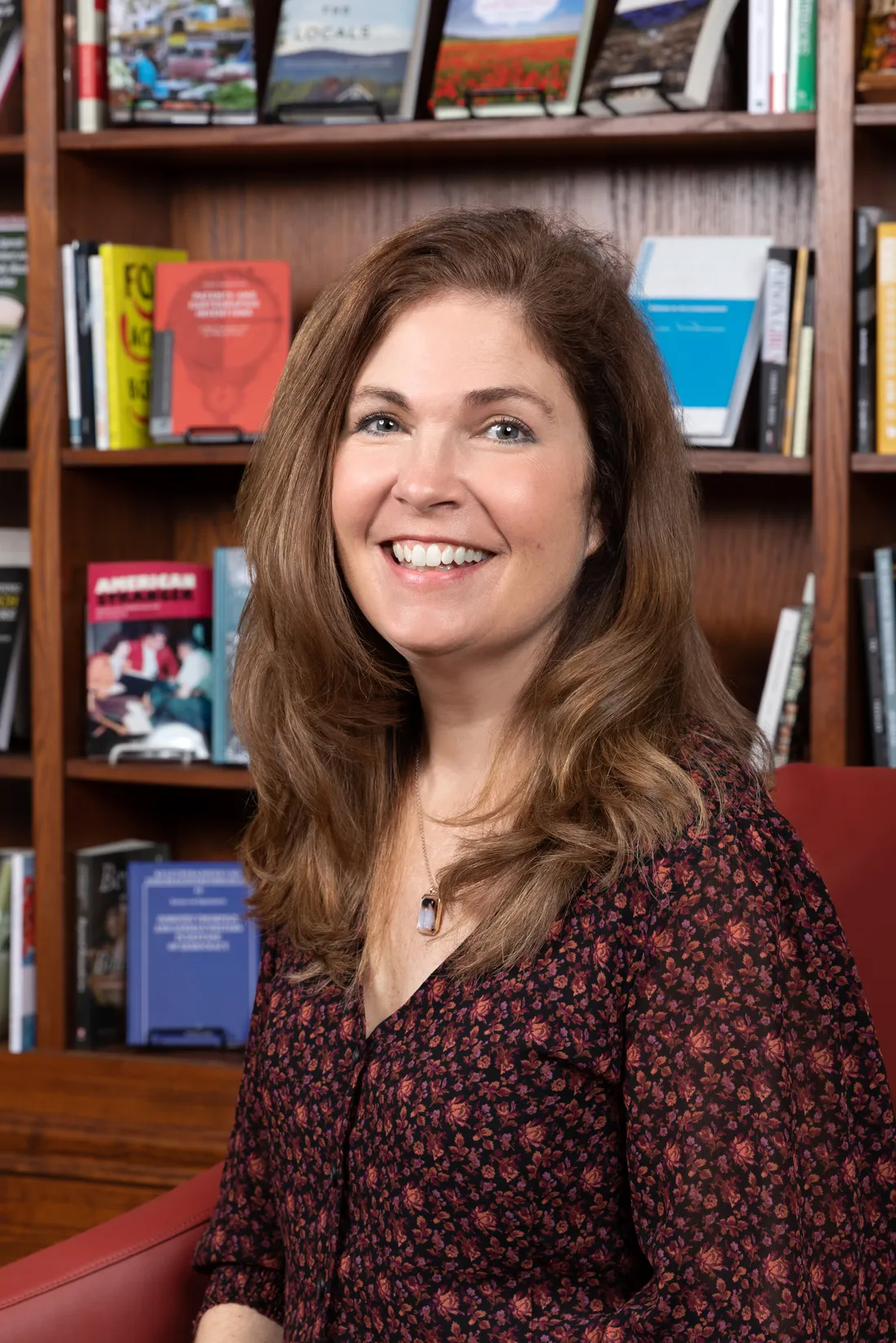
Dorri Beam believes U.S. social change movements are rooted in the ideas of 19th-century French philosopher Charles Fourier.
Dorri Beam is using her fellowship to complete a book project about the impact of Fourierism on 19th-century American literature. That he was a staunch critic of capitalism, individualism and the family made him an “unexpected influence” in the early United States, she notes. His ideas impelled many Americans to establish small intentional communities—forerunners of today’s co-ops and communes—that emphasized cooperation over competition.
“I ask to what extent we understand Fourier’s beliefs to animate questions of belonging, personhood and collectivity,” says Beam, author of Style, Gender and Fantasy in 19th-Century American Women’s Writing (Cambridge University Press, 2010).
Her project highlights Walt Whitman, Emily Dickinson, Harriet Beecher Stowe, Frances Harper and Harriet Jacobs, all of whom experimented with social organization in their writing to imagine a variety of economic, political and social utopias.
Beam’s fellowship complements this year’s Syracuse Symposium, whose theme is “Conventions.” She considers Fourier one of many key thinkers throughout history who have defied convention, which refers to a generally accepted principle, method or behavior. Such defiance is exemplified by the proliferation of anti-capitalistic communities and worker-owned businesses borne by the economic uncertainty of the COVID-19 pandemic.
It is against this backdrop that Fourierism—and Beam’s scholarship—is finding new audiences. “Dorri is helping engage the meaning and impact of ‘Conventions’ from diverse perspectives and genres, locally and globally,” May says. “It’s timely, relevant work.”
Gareth Fisher: Exploring Secular-Religious Boundaries
Temples, churches and mosques have dotted China’s landscape for more than 2,000 years. But with the establishment of a communist state in 1949, many of the sites have been destroyed. Those remaining have been rebranded “Religious Activity Venues,” with public practice outside of them theoretically prohibited.
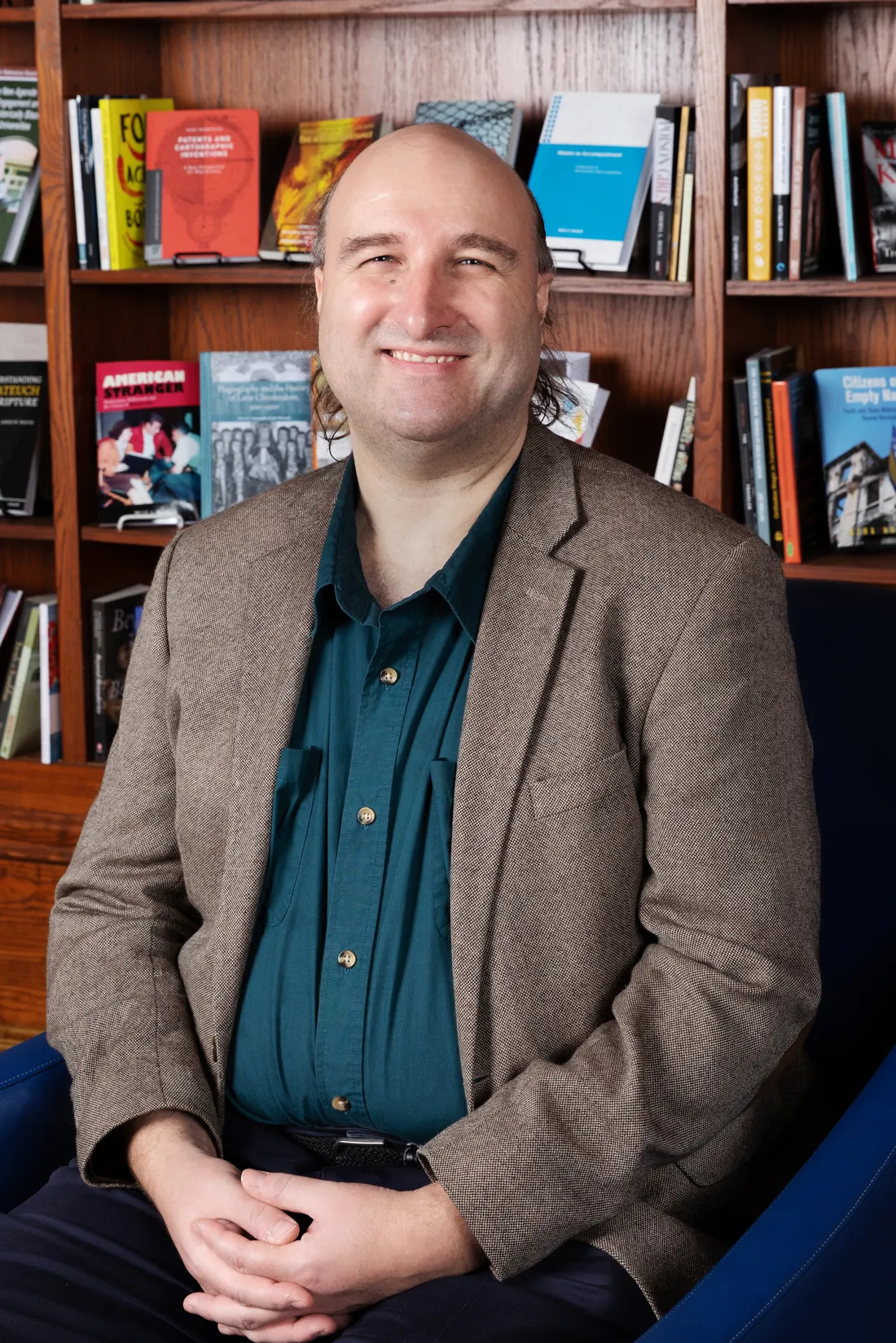
Gareth Fisher considers his research a response to the dearth of long-term, fieldwork-based studies of religion in contemporary China.
Gareth Fisher has been drawn to these spaces for two decades. He is particularly interested in four temples on China’s sprawling east coast. Despite their relative isolation, the sites combine elements of the world’s largest Buddhist sect (Mahayana Buddhism) with the biggest ethnic group on the planet (the Han Chinese). Many of their inhabitants also embrace alternative views and lifestyles, motivated more by self-expression than political or economic dissatisfaction.
Such temple-centered communities are at the heart of Fisher’s fellowship, which includes a book project about China’s “intensification of secularization.” The project is a response to the dearth of long-term, fieldwork-based studies of religion in contemporary China, he explains. “What research is out there usually doesn’t address secularization at the micro level. I’m filling this gap through a detailed study of everyday persons wrapped up in the temples’ complex existence.”
Author of From Comrades to Bodhisattvas: Moral Dimensions of Lay Buddhist Practice in Contemporary China (University of Hawaii Press, 2014), Fisher says the four sites are engaged in construction and renovation as well as efforts to expand Buddhism’s public outreach. “As temples are remade into spaces of nonconformity, they sometimes transform their members, however, more than the society around them.” Viewing the spaces through a cultural anthropological lens enables him to understand their transformations more fully.
For all of China’s attempts at secularization, religion is on the rise. Chinese Buddhism, a form of Mahayana, accounts for 18% of the population on the mainland. Fisher hopes his fellowship provides a “rare glimpse into the lives of ordinary Chinese,” for whom religion is as much about belonging as belief.
Jeanette Jouili: Countering Negative Stereotypes
For more than a decade, Jeanette Jouili made annual trips to London to study how British Muslims used creativity to respond to the war on terrorism and to resist being typecast as security threats. “This climate was used to justify enacting counterterrorism measures against their community,” says Jouili, who, from 2007-18, interviewed young British Muslim artists and culture workers from London-based Muslim charities, interfaith groups and non-religious social organizations.
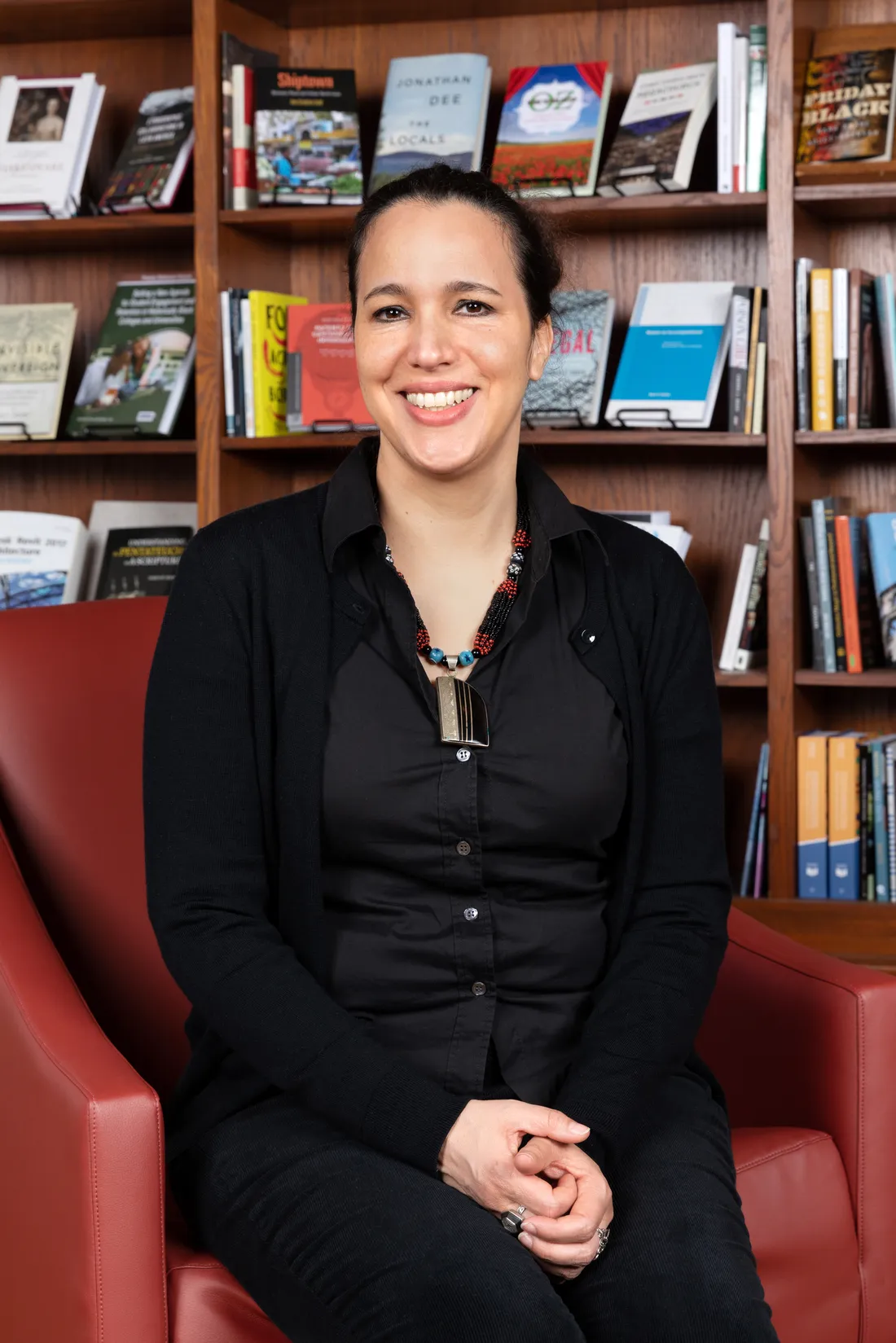
Jeanette Jouili examines how British Muslims use creativity to respond to the war on terrorism and to resist being typecast as security threats.
Jouili draws on her fieldwork in London to “lay bare how British Muslim arts practitioners—and their audiences—have persisted in coming together to forge an artistic and activist community for themselves.” That they have done this within a broad political and discursive context, which “time and again insists on linking them to violent extremism,” is important to understand, she continues.
During her fellowship, Jouili is writing a seven-chapter book project that looks at how British Muslims navigate the politics of counterterrorism as well as its attendant state policies and public discourses by “forging their own community productively and creatively.”
A cultural anthropologist by training, she is interested in different perspectives on religion, politics, and ethics. Her findings indicate that, for most British Muslims, any sense of community, healing or normalcy is a hard-fought win. “Nonetheless, they have created alternative spaces for themselves and have formulated languages that counter the pervasive ones of counterterrorism,” says the author of Pious Practice and Secular Constraints: Women in the Islamic Revival in Europe (Stanford University Press, 2015).
Prejudice against Muslims is so rampant in London that even “less overtly political cultural practices are understood as sites of resistance,” says Jouili, adding that politically outspoken Muslims are usually labeled radicals. “I want to undo the pernicious linking of British Muslims to terrorism and provide fresh insights into their rich, complex, diverse and continuously evolving lives.”
Robert Wilson: The Climate Crisis and Landscape Studies
Drawn to the complex relationship between society and nature, Robert Wilson engages in the environmental humanities—both in his fellowship project and on campus, more broadly. He is part of a cohort of humanists, including historians, cultural geographers, philosophers and English scholars, that bring their disciplinary mettle to bear on critical discussions about sustainability and climate change.
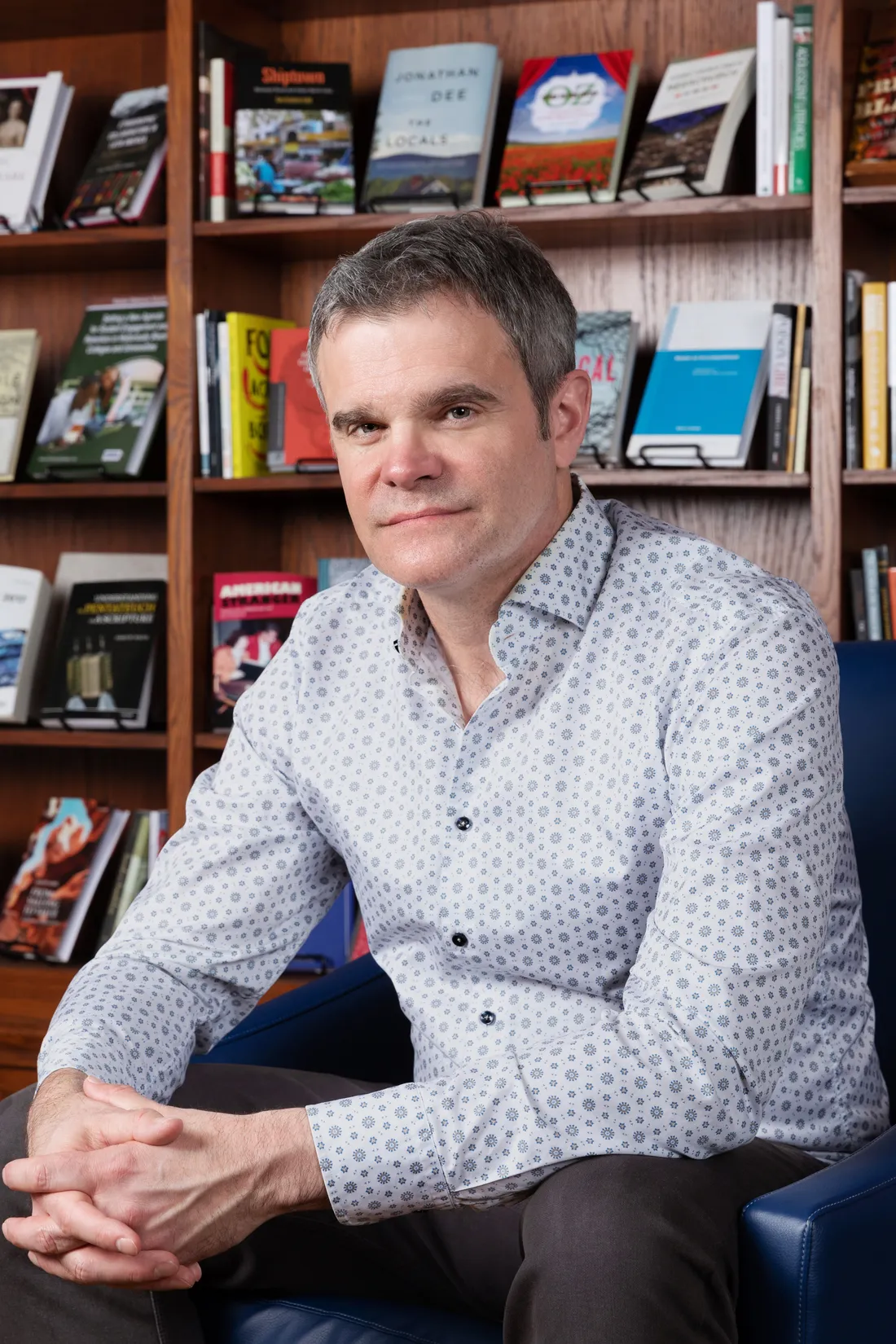
Robert Wilson draws on the environmental humanities to illuminate the relationship between society and nature.
Wilson is known for his fresh take on landscape studies, looking at them in context of the climate crisis and the Anthropocene—the current geological epoch where human activity is the dominant force in reshaping Earth.
“Scholars have long considered the landscape an intentional outcome of human activity. With the recent surge of effects in human-caused climate change, the traditional viewpoint has become untenable,” says Wilson, author of Seeking Refuge: Birds and Landscapes of the Pacific Flyway (The University of Washington Press, 2010).
Wilson is using his fellowship to write a seminal paper on landscape studies, climate change and the Anthropocene. He also hopes to raise public awareness of the environmental humanities. Time is of the essence, Wilson adds, because the climate is changing faster now than at any other point in the past 10,000 years.
“This crisis poses profound questions for those of us in the humanities, like ‘What does it mean to be human in such a radically changed world?’” says Wilson, who co-teaches the senior capstone seminar in Environment, Sustainability and Policy, an integrated learning major that he helped found about four years ago. “I want to make the climate crisis a humanistic focal point at Syracuse.”
This year’s Humanities Center Faculty Fellows will participate in a virtual Meet the Scholar Coffee Hour on Friday, March 4, from 2-3:15 p.m.

